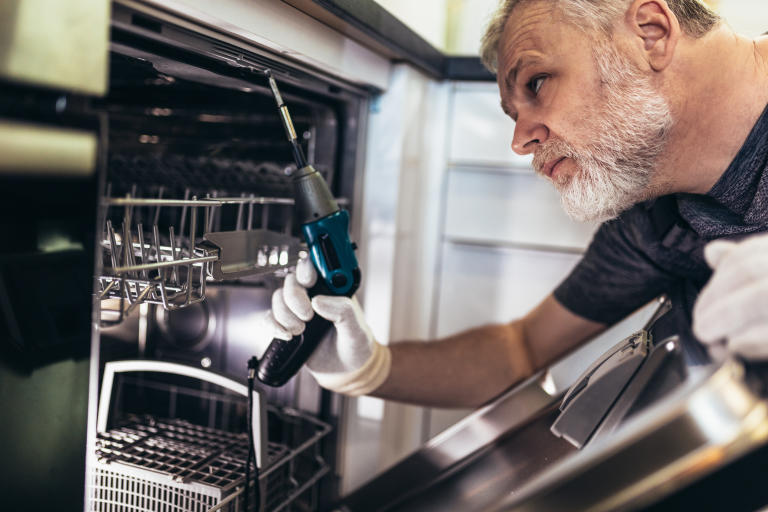- Blog
- The Basics of Appliance Maintenance
The Basics of Appliance Maintenance
Sep 21, 2023

Repairing or replacing any type of large household appliance (refrigerator, washer, dryer, dishwasher, etc.) can run into the hundreds if not thousands of dollars. So maintaining those appliances regularly is essential for a smooth and trouble-free living experience — not to mention to help keep your budget in check.
To ensure your appliances are always in top-notch condition, let’s explore some basic cleaning and care tips for common household appliances.
Refrigerator: It’s crucial to regularly clean the interior, wipe spills and check the temperature settings.
Oven and Stove: Regular cleaning with appropriate products can keep your oven and stove performing at their best and prevent smoke or even fires.
Microwave: Remember to wipe down the microwave’s interior after each or every few uses.
Dishwasher: Regularly cleaning the filter and inspecting the spray arms can optimize its performance.
Washing Machine and Dryer: Clean the lint trap, hoses and drum regularly to avoid lint buildup and to maintain efficient drying cycles.
Additionally, proper usage and handling of appliances (such as avoiding overloading the washing machine or closing the refrigerator door gently) can significantly extend their lifespan. By following these simple maintenance practices, you can ensure your appliances function smoothly and efficiently for years to come.
Seasonal Maintenance Checklist
Each season brings its unique challenges for household appliances, and taking proactive measures can prevent breakdowns, reduce energy consumption, and extend their lifespan. To keep your appliances running smoothly throughout the year, it can help to follow a seasonal maintenance checklist like the one below.
Spring:
Clean or replace air conditioner and HVAC system filters.
Schedule professional maintenance for your air conditioner and HVAC system.
Dust and clean the condenser coils on the back or bottom of your refrigerator.
Vacuum the refrigerator’s coils and vents to improve efficiency.
Clean the oven, stove and microwave, removing food debris and grease.
Inspect the dishwasher for clogs and clean the filter.
Check washing machine hoses for signs of wear and tear and replace if necessary.
Clean the dryer’s lint trap and exhaust duct to prevent fire hazards.
Declutter and organize your kitchen and laundry area.
Summer:
Clean and inspect your grill, ensuring gas lines are clear and functioning.
Check the pool and spa water quality ; adjust chemicals as needed.
Clean pool and spa filters and skimmers.
Inspect outdoor refrigerator and freezer seals for proper functioning.
Fall:
Schedule a professional inspection for your heating system.
Clean and maintain your fireplace, including the chimney.
Check and replace furnace filters.
Test and inspect smoke and carbon monoxide detectors.
Clear gutters and downspouts to prevent water damage.
Inspect outdoor appliances for any weather-related damage.
Winter:
Check and maintain your snowblower and generator.
Test your home’s backup power supply.
Clean and maintain kitchen appliances for holiday cooking and baking.
Check and replace batteries in smoke and carbon monoxide detectors.
By following this seasonal checklist, you can ensure your appliances are well-cared for throughout the year, providing you with reliable performance and peace of mind.
Troubleshooting and Common Problems
Troubleshooting and addressing common appliance problems as they happen is essential to ensure your household runs smoothly. Identifying issues early on can prevent minor problems from escalating into major (and majorly expensive) malfunctions. Keep an eye out for signs like strange noises, leaks, reduced performance or error messages on your appliances. For simple problems, DIY fixes can be a cost-effective solution. Cleaning filters, checking hoses and ensuring proper ventilation are some basic steps you can take.
However, it’s crucial to know when to seek professional help. Complex or potentially hazardous problems should be left to skilled technicians to avoid any risks or further damage. If you’re renting a home or apartment, you should also make sure to report maintenance needs or issues to your landlord or appliance company — they can provide timely assistance or arrange for repairs, keeping your appliances in top condition throughout your lease term. Taking these proactive steps will not only extend the lifespan of your appliances but also contribute to a more comfortable and stress-free home environment.
Saving Energy and Costs
Adopting energy-efficient practices for your appliances can lead to significant savings on your utility bills as well as a positive impact on the environment. Simple habits like using cold water for laundry, running the dishwasher with a full load and regularly cleaning refrigerator coils can make a difference in reducing energy consumption. Moreover, consider investing in energy-efficient appliances that are designed to use less power while still delivering top performance. Many utility companies offer rebates and incentives for purchasing energy-efficient appliances, making it even more appealing to upgrade.
Use Acima Leasing to Find the Appliances You Need
Whether you need a sleek new refrigerator, a state-of-the-art oven or a high-performance washing machine, we have you covered. With our lease-to-own* alternative-to-financing solution*, you can enjoy the shopping power you want to bring home the appliances you desire.
Don’t miss out on creating your dream living space. Shop now and take your first step toward a stress-free home!
Common Questions
Are there any special care instructions for stainless steel appliances?
To maintain the luster of your stainless steel appliances, use a gentle cleaner and microfiber cloth. Avoid abrasive materials and harsh chemicals that can scratch or damage the surface. Buff the stainless steel in the direction of the grain to prevent streaks.
What should I do if my appliance stops working?
If your appliance stops working or experiences any issues, first check if it is still under warranty. If it is, contact the manufacturer or retailer for repairs or replacement. If the warranty has expired, consult a professional appliance repair service for assistance.
How can I reduce energy consumption for my appliances?
To reduce energy consumption, consider using energy-efficient appliances with the ENERGY STAR® label. Additionally, unplug appliances when not in use, run full loads in your dishwasher and washing machine, and clean dryer lint filters regularly.




